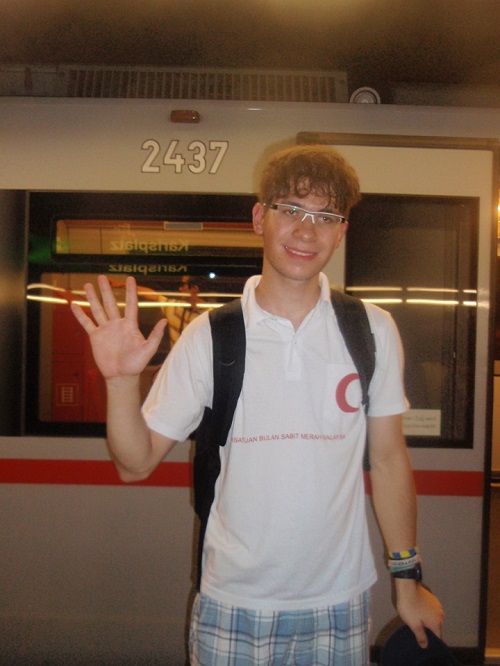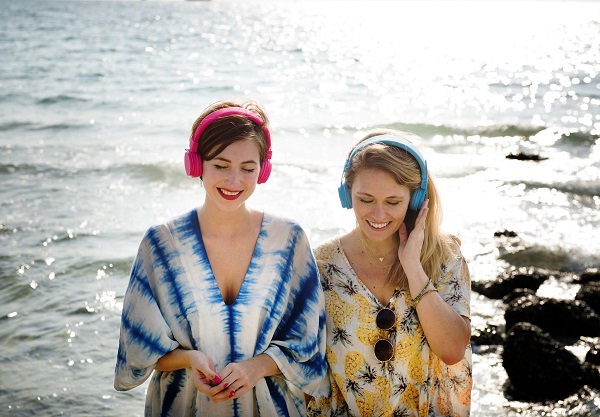Whether you go swimming, skiing, on a business trip, or anywhere else, you probably won’t avoid any stress from traveling. Even I, who travels in my free time and have visited different countries on a total of three continents, am sometimes afraid whether I’ll find the right platform, not forget my passport or a ticket. So, to make traveling more enjoyable for you, I’ve compiled a list of seven points that describe how to survive the journey.
1. Plan your way.
Unless someone else organizes the trip for you, find out the relevant connections and buy tickets in advance. Nowadays, those from large companies can be purchased online, and sometimes you don’t even have to print them; just save them to your mobile phone. Don’t forget it and a charger. Have an alternative journey prepared even if you miss the bus or train or the plane flies away.
“I try to prepare everything in advance. When I have to go somewhere, I draw a map. I have GPS and IDOS [Czech online route planner, translator’s note] on my mobile. I will also monitor current delays and alternative connections. That helps me a lot. When I go on the usual route, I know what to say when buying a ticket. When I head somewhere I don’t usually travel to; it’s more difficult to explain what I want, I often have to write it down and sometimes even show it,” Natálie, a 22-year-old autist, says. Thirty-year-old Bára uses StreetView as a great helper. “I can’t count the number of instances I walk the whole route with it when I go somewhere for the first time. I will also draw a plan if my device with a print screen / offline map runs out and I mark and remember landmarks (restaurants, crossings, special buildings,…),” Bára explains.
2. Take a train instead.
The train has more advantages over the bus: you usually have more comfort, a wider range of goods, read without getting sick, and stops are signed clearer. You can choose seats online and, in many trains, there’s only one in a row. On the other hand, the train can only run on railways, so there are unfortunately places you can’t get to. If you happen to be unable to buy a ticket in advance, the train is crowded. Although you face the inconvenience of standing in an aisle or sitting crammed in a compartment, it is possible that the dining car, if it is on the train, will not be complete, you will be there in peace, and there is always air conditioning.
“I don’t like long-distance buses unless they’re the yellow ones, run by Student Agency. I’m going to a place I don’t know, and the stations on those buses are often not announced. I’m always afraid I’ll miss the station,” Daniel, 28, describes his anxieties. It is trains and buses with a guide/steward that are safe for autistic people. “I’m sure it calms me down when there are more guides or there are people in the Student Agency buses who care,” Bára adds, recounting a fun story that it has already happened to her that the train guide told her she looked faint and took her right down inside the train where he knew there was a place to sit.
3. Take headphones if you need to.
If you are sensitive to sounds, take headphones with you. You can play music, spoken word or other sounds that will do you good. However, be careful not to miss announcements; you should instead rely on the displayed text. For example, in an airplane, it is essential to be cautious at the beginning when a passenger safety briefing is taking place. However, some airlines will release an instructional film instead. Some autistic people wear headphones in the streets for soundproofing.
4. Don’t get sunburnt.
If you go somewhere in the summer months, take water with you (unless you fly by plane as you won’t be allowed with liquids over a certain number of milliliters onboard) and drink it along the way. In addition, book a seat where the sun will not shine on you or pull the curtain. Don’t forget what you use for sunbathing or eventual products to soothe burnt skin. Furthermore, protect the places that get burnt the most (nose, ears, back of the neck). Finally, use suitable headgear to prevent overheating.
5. Do not travel overnight.
If you like peaceful, comfortable, and undisturbed sleep, avoid night travel. You don’t sleep comfortably on the seats of vehicles, and you don’t even have a place to take a bath or shower. And when you finally get where you are heading, you’re still tired and have to go to bed again. So you better go during the day or, if it’s not possible, divide the route and spend the night somewhere. You may arrive later, but, at least, you will be rested, which is very important.
6. Use quiet cars or women-only compartments. 
In the trains of some carriers, there are so-called silent cars, which are compartments where one must not speak aloud or play any sound. If you are a woman and afraid of men’s intrusive behavior, you can use the women-only compartments on Czech Railways trains. In some countries, even gender-separated cars are compulsory and mixed vehicles are only for families. But again, there can be a problem if you travel with a person of another gender who is not your relative.
7. In case of route changes or delays, contact the information service staff or wait for them to arrive if you feel confused.
Sometimes, the bus or train is delayed or that its route suddenly changes, most often due to faults on the way. At large stations, you will find information boards informing you about these changes. If you cannot read them or still feel confused, ask the information desk staff for more information. If you are at a bus stop with no information center, wait on the spot as a transport company person will probably appear there to “pick up” passengers. Likewise, in the Czech Republic, it is legally obligatory to state the carrier’s contact details on timetables. If you are outside the Czech Republic and in a country where this obligation does not exist, but you would like to go somewhere without an organized trip, use the services of local people, such as the Couchsurfing website. There, people offer accommodation or escort to the location where they live.
“I took a bus with a friend to an event. Unfortunately, we got off prematurely, somewhere on the outskirts of the city, and we didn’t know it at all, so I called a taxi,” 25-year-old autist Šimon says, proving to us that they coped with things successfully. Travelling can be a fun and exciting activity despite all the trouble. You go to places where you don’t usually stay, and you may gain new experiences. And it’s worth the effort, isn’t it?
Despite all the preparations, did an unexpected event happen to you? How did you handle it? How did you deal with the panic and anxiety of sudden change? How did you prevent a possible meltdown if something/someone upset you? Please send us your advice.
And if you happen to be in the situation and feel an impending panic or meltdown, remember the 26-year-old autist Anna’s sentences: “I probably have a typical aspie reasoning that if something doesn’t go according to a plan or everything falls apart, it’ll be a terrible disaster and a downfall. I’m just trying to remind myself that the train that I’ve missed isn’t the end of the world, that it may be annoying, but it’s quite easy to solve. Then, it helps me give myself partial tasks; for example, I tell my head that we will now calculate the shortest way to the platform or weave between the people most effectively here. This way, we will slip the suitcase to make it easier to negotiate. Traveling consists of many stimuli, unknowns, noise, volatilization, people around you that you can’t choose… “Anna says and manages to eat a steak with bread with one hand. She has her second one ready on a wheeled suitcase. “And don’t forget to eat. This is very important. If you are stressed with unfamiliar food, take your own or buy the one you know. Sometimes, when I’m calm, then I train myself tolerance, so I try eating out something new,” Anna adds and, with the wheeled suitcase, sets out on another adventurous journey.
________________
Text: Ivana Recmanová / quotations from FB groups for people on the autistic spectrum / Photo: Pixabay.com, Mgr. Šimon Hlinovský









